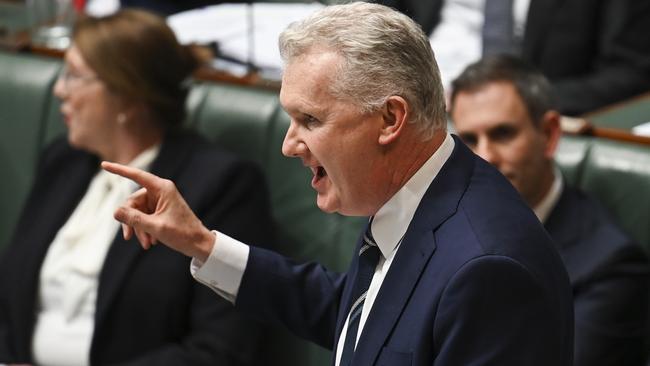Tony Burke considers small business IR exemption
The casual employment changes have been blasted by employers, and Senate crossbenchers have voiced their reservations.

Exemptions for small business from Labor’s casual employment changes are being considered by the federal government as employers intensify attacks on the plan and Senate crossbenchers express reservations.
Workplace Relations Minister Tony Burke said the government was looking at small business exemptions as it consulted over the second wave of industrial relations changes, including greater rights for casual workers to convert to permanent employment.
Asked if the government proposed a limit on the size of the business that the laws would apply, Mr Burke told the Sydney Institute that “the concept of where we provide small business exemption …. is something where the consultation is still ongoing, we haven‘t landed on that yet”.

Harvey Norman chairman Gerry Harvey said the casual employment changes could potentially cost jobs as additional costs were forced on businesses.
“I don’t know why the government would want to do it because to me it does not make any sense,” Mr Harvey said.
“The problem is that the costs go up and then your profits go down. If I were to make one person permanent, I would probably have to get rid of another casual person.”
He said of the company‘s 500 casual employees 99 per cent would want to keep their casual status. “A lot of people don’t only work for us,” he said. ”They might work for us for three days and then have another job so it does not suit their lifestyle.
He said the company was usually able to accommodate workers who wanted to transition to a permanent role.
Backing no change to the casual employment laws, Bunnings Group managing director Mike Schneider said while “we’ve long had an employment model built around permanent roles and putting down roots to grow a career with us, we do have team (members) who choose and prefer casual positions.
“We appreciate that for some team at different stages of life a casual role can be more appealing or necessary given their personal circumstances. For example, we have a number of school and uni students working with us who really love casual positions because they can balance their study with work and pick up additional shifts during semester breaks.
“We also have a number of retired tradies that really value and benefit from the flexibility of a casual role that allows them to pursue interests while remaining connected to a job and the industry. Our view is that the current settings on casual employment are clear, flexible and work well for our team members, as well as our business.”

Business Council of Australia chief executive Jennifer Westacott accused the government of trying to restrict casual employment.
“People are struggling with a skyrocketing cost of living; they’re paying more for their mortgages or rents and they are anxious about the direction of the economy,” she said.
“What objective are we trying to solve – do we want to do what the unions suggest and remove casual work altogether or do we want to give workers the flexibility they need to take on that extra shift to make ends meet.”
Senate crossbencher Jacqui Lambie said she was concerned about the impact of the changes on small businesses.
“After years of challenges due to Covid, natural disasters and now the cost of living crisis, they already have their backs to the wall. They are worried about what the new IR reforms might hold for them,” she said.
“It‘s early days in the process yet. I am keeping a close eye on these reforms and their impact on small businesses in particular.”
Key crossbencher and ACT Independent Senator David Pocock will on Wednesday hold a roundtable with unions and businesses about the bill.
“I’ve been engaging with Minister Burke and his office as this next tranche of industrial relations reform is being developed, emphasising the need for detailed consultation with all stakeholders,” he said
“This roundtable is an opportunity to hear directly from impacted workers, businesses and their representatives and get feedback on the proposed reforms.”
One Nation Senator Pauline Hanson said she was alarmed at the move to shorten the time a casual could apply to convert to permanent employment from 12 to six months.
“I do want to protect small businesses in this,” she said. ”This is not good for employers … it will send them broke. Labor is big-noting themselves as the saviour of casuals and that‘s not the case.”
More Coverage








To join the conversation, please log in. Don't have an account? Register
Join the conversation, you are commenting as Logout